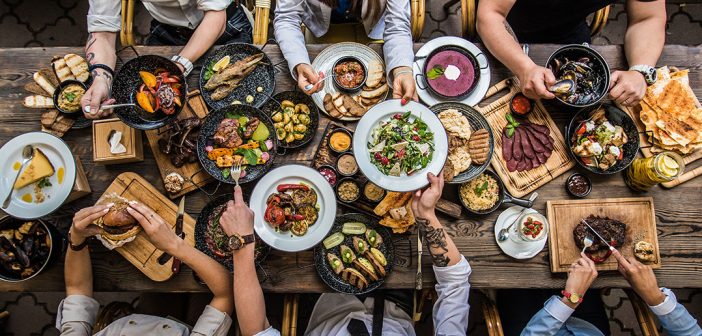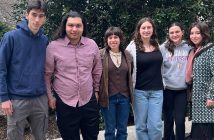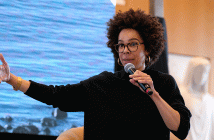For the second year, Fordham College at Lincoln Center (FCLC) has created an experiential theme for first-year students. This year’s focus is branded “Food for Thought.” Like last year’s theme on magic, this series of events and programs sets out to create a common intellectual starting point for new students—even before they arrive on campus.
Over the summer, students received a collection of essays by New York Times and T Magazine columnist Ligaya Mishan. Mishan has been chosen as this year’s Mary Higgins Clark Chair in Creative Writing. She is known for her Hungry City column, which explores many of New York’s unsung restaurants and multicultural fare often found in the city’s outer boroughs. Yes, she reviews haute cuisine, but she also grapples with cultural issues found in the workaday kitchens of Jackson Heights, Queens, or Brighton Beach, Brooklyn.
“My job was to tell you whether the food was good or not and describe the food, but at a certain point I ran out of words,” she told FCLC students at their Aug. 27 orientation. “I had to find the stories around the food. Once I started asking questions and found out the stories about the people who make the food, that was far more interesting than whether it was delicious or not.” Mishan’s essays and talk provided a precursor for the year that lies ahead. She delved into questions of authenticity, cultural appropriation, and the very notion of “ethnic” food.
“Everybody has ethnicity,” she said. “In the West, we only think of ethnic as nonwestern.”
Sarah Gambito, associate professor and director of the creative writing program, was on the committee that helped select Mishan as the Mary Higgins Clark Chair.
“She’s really a cultural critic,” said Gambito, adding that the Mishan also happens to be the first person of color to hold the chair.
“We were interested in food as culture,” said Gambito, author of Loves You, a book published this year that is part poetry, part cookbook. “A lot of our first-year students are new to New York City … Food is a way to travel and learn about the city.”
Mishan will return to campus on Oct. 7 to deliver the annual Mary Higgins Clark lecture, titled, “Off the Rails in Hungry City: Confessions of an Accidental Food Writer.” The lecture is open to the public, though first-year students are particularly encouraged to attend. Gambito said, “Part of the mission of the chair is to provide different avenues of thought for students to find their way in the world.” To that end, Mishan will return once again in the spring to offer students a food-centered walking tour.
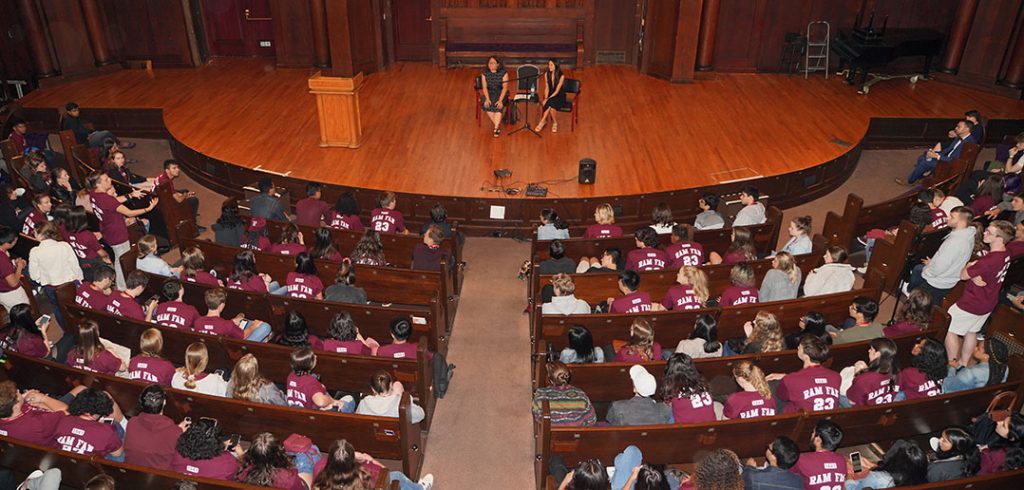
Concluding a Q&A with Julie Chun Kim, Ph.D., associate professor and associate chair of English, Ligaya Mishan took questions from first-year students at student orientation, which was held at the New York Society for Ethical Culture.
Thinking Beyond Food as Culture
When one thinks of food, one often conjures images of home and one’s culture. But there are other things to think about when studying the food we eat. There are environmental concerns related to mass food production. There are body image and eating disorders to consider. There are food deserts. All this, and much more, will be parsed and pondered by the Fordham College of Lincoln Center Class of 2023, said FCLC Dean Laura Auricchio, Ph.D.
Auricchio said she, too, usually associates food with culture. She remembers when her Italian-born grandmother prepared Sunday dinners served at 3 p.m. While the meatball recipe was shared, her grandmother clearly left something out.
“No one could ever replicate them, how do they compare to grandma’s became a mythical link to our Italian past,” she said. “But when [my grandmother]came to the U.S., it wasn’t ethnic food; it was just food, it was food of the lower classes.”
But whether it was her meatballs served by her father’s side of the family or corned beef and cabbage dished out on her mother’s side, her New York City upbringing was distinct from the experience of young people growing up in “food deserts” found in the city’s poorest neighborhoods, where fast-food restaurants vastly outnumber supermarkets with fresh vegetables. She said this would be one of the many issues that “Food for Thought” will also address.
On Oct. 10, up to 15 students can sign up to visit and help garden at the New York Botanical Garden’s Edible Academy. The academy is a hands-on educational garden where local kids from the Bronx get the rare opportunity to help raise and harvest vegetables. Ram Vans will take FCLC students to the garden for a tour, a bit of gardening, and a tasting.
“We want students to learn about food insecurity and food deserts,” said Auricchio. “But we also have a great relationship with the Botanical Garden that we want Lincoln Center students to take advantage of.”
With the support of the Office of the Dean of Students, Office of Residential Life, and other University groups, the Fordham College at Lincoln Center Dean’s Office has commitments to hold several other events with dates yet to be announced.
Continuing on the theme of food justice, Associate Professor of Spanish Carey Kasten, Ph.D., will take students to visit New Roots Community Farm, a Bronx collective that provides urban agriculture education to nearby residents.
A visit to “Chow,” an exhibition at the Museum of Food and Drink, will examine how Chinese American restaurants relate to notions of stereotype, tradition, food culture, and what it means to be American.
Together with Aramark, Fordham food services will provide “city nights,” highlighting the cuisine of different cities and regions, from Chicago’s deep dish pizzas to Philly’s cheesesteaks. The theme nights should help cure a bit of homesickness, Auricchio said, and allows students to share their local fare.
In partnership with Counseling and Psychological Services, the FCLC dean’s office will hold a session on eating disorders, which affects more students than many realize.
“We have a myth in our mind about who suffers from eating disorders; even if you don’t have that challenge, you may very well have friends and family who are struggling with eating disorders and you might not know,” said Auricchio.
In partnership with Campus Ministry, the Center for Community Engaged Learning, Commuter Freshmen Mentors, and Residential Life, there will be opportunities for students to engage with St. Paul the Apostle’s food projects.
“We wanted to create events where commuter students and resident students could engage in our community right here in the Lincoln Center neighborhood,” said Auricchio. “Most people think of this as a very wealthy area, and it is, but there’s also a lot of need here. We can engage with those communities and we should.”
Fabio Parasecoli, author of Food (MIT Press, 2019), will drop by for a lunchtime talk on food networks focusing on how food gets to our tables.
“Every time we eat we connect to these complex networks and we need to think of the impact that they have on the world,” said Auricchio.
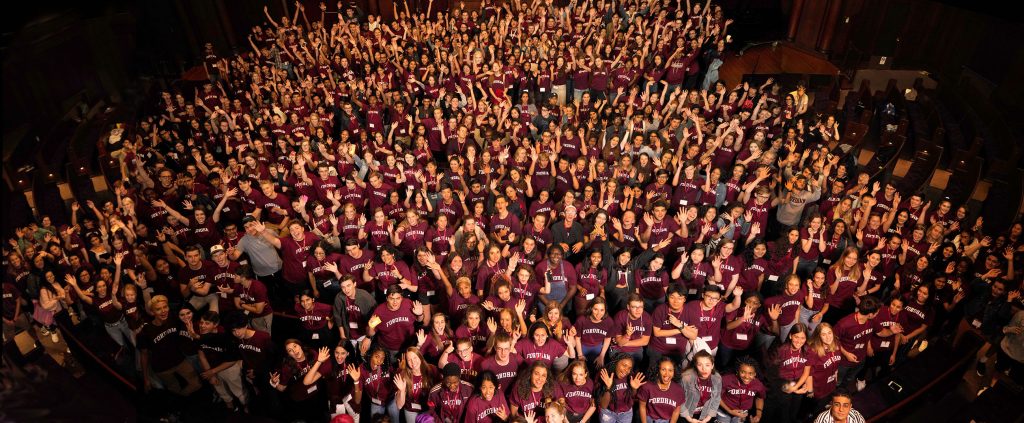
The Fordham College at Lincoln Center Class of 2023
